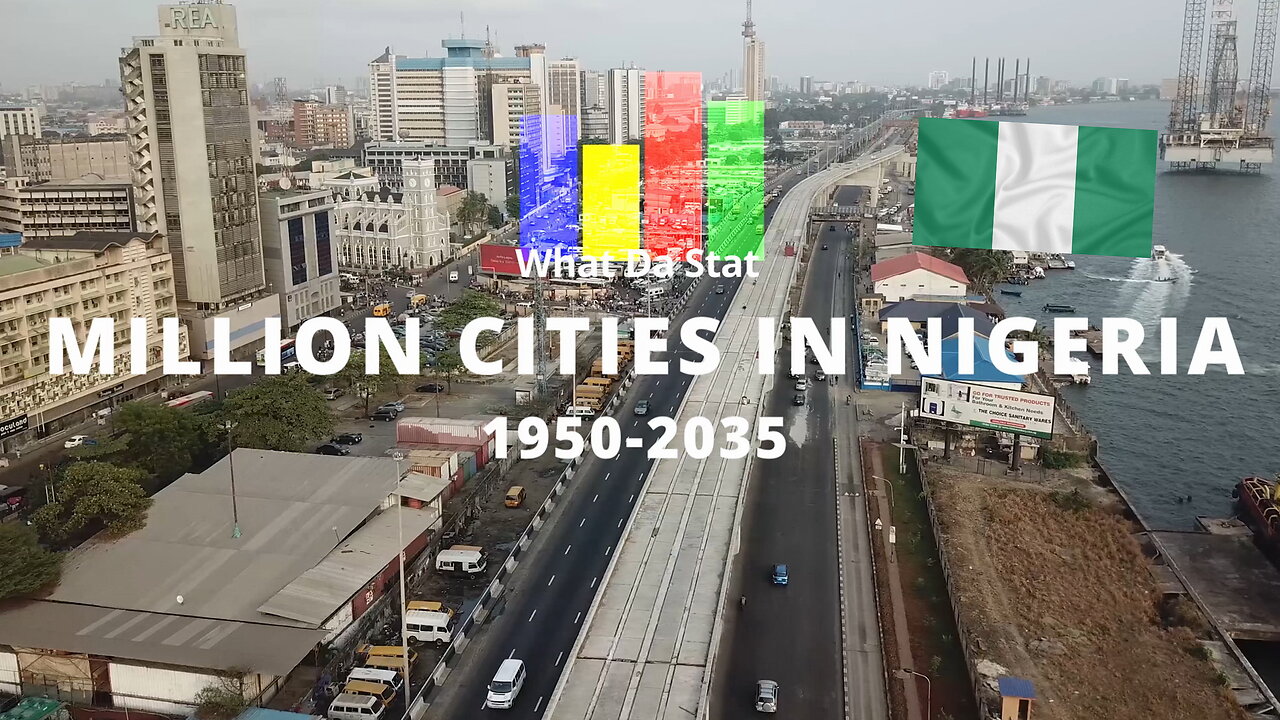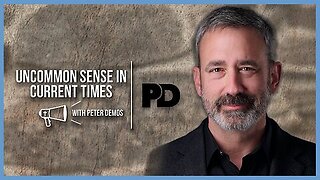Premium Only Content

Million Cities in Nigeria 1950-2035
This bar chart race shows urban agglomerations in Nigeria with over one million urban population, and urbanization in percentage and total urban population, from 1950 to projected in 2035.
State flags are depicted.
Since 1950, Nigeria has seen substantial urbanization, with a notable increase in the number of "million cities," reflecting significant demographic shifts and economic changes.
Urbanization Rate: In 1950, only about 10% of Nigeria's population lived in urban areas. By 2020, this proportion had risen to over 50%, indicating a massive rural-to-urban migration driven by factors such as economic opportunities, infrastructure development, and population growth.
Growth of Million Cities: In 1950, Nigeria had no cities with populations exceeding one million. Lagos, the country's largest city, began to experience rapid growth in the 1960s and 1970s. By 1990, Lagos had surpassed the one million mark, followed by other cities like Kano, Ibadan, and Abuja. By 2020, Nigeria had more than ten cities with populations over one million, including Port Harcourt, Kaduna, and Benin City.
Population Concentration: The growth of these million cities has led to high population densities in urban areas, particularly in Lagos, which has become one of the largest cities in Africa. The concentration of populations in these urban centers has created significant challenges in terms of housing, infrastructure, and service delivery.
Economic Impact: The rise of million cities has been closely linked to Nigeria's economic development, with these urban areas becoming centers for trade, industry, and services. Lagos, for instance, is the economic hub of Nigeria and contributes a significant portion of the country's GDP. However, rapid urbanization has also led to challenges such as unemployment, inadequate infrastructure, and urban poverty.
Overall, since 1950, Nigeria has undergone a dramatic shift towards urbanization, with the emergence and growth of million cities being a key feature of this transformation. This urbanization has been a driving force in Nigeria's economic development, but it has also brought about complex social and infrastructural challenges.
Data sources and projections: World Bank and UN
Music: Stellardrone - To The Great Beyond https://soundcloud.com/stellardrone/stellardrone-to-the-great-beyond
Stellardrone - To The Great Beyond By Stellardrone is licensed under a Creative Commons License.
Data visualization created with flourish.studio https://flourish.studio
-
 LIVE
LIVE
FusedAegisTV
2 hours agoRiding the Night R.A.A.M. Train | Gears of War 1 (Insane) Pt. 1 w/Rance
79 watching -
 LIVE
LIVE
The New American
1 hour agoTrump Picks Kash Patel to Lead And Reform Corrupt FBI | The New American Daily
370 watching -
 45:46
45:46
The Kevin Trudeau Show
4 hours agoThe 3 Books You MUST Read to Become Rich | The Kevin Trudeau Show Limitless | Ep. 70
3.16K3 -
 1:58:38
1:58:38
The Charlie Kirk Show
3 hours agoThe Hunter Pardon + Kash Patel's FBI + Ron Paul's DOGE Plan | Seifert, Sen. Blackburn | 12.2.24
90.6K16 -
 DVR
DVR
vivafrei
4 hours agoBlackmail & Pardons! From Matt Gaetz to Hunter Biden! Live with VillgeCrazyLady! Viva Frei
34.2K15 -
 51:58
51:58
Uncommon Sense In Current Times
3 hours ago $0.40 earned"Can the Government Learn from Elon Musk’s 70% Labor Cut? A Deep Dive into Inefficient Agencies"
5.77K -
 52:25
52:25
PMG
2 days ago $0.53 earned"Hannah Faulkner and Bryanna Robinson | Corruption Exposed"
5.06K -
 17:36
17:36
ROSE UNPLUGGED
3 hours agoGregg Jarrett Weighs in on Lawfare, Penny & Riley Cases
2.82K -
 1:01:47
1:01:47
The Dan Bongino Show
5 hours agoBiden Gives a Giant Middle Finger To America On His Way Out (Ep. 2380) - 12/02/2024
786K2.21K -
 2:06:59
2:06:59
Steven Crowder
5 hours ago🔴 Joe Lets Hunter Off the Hook & Will Kash Clean Up the FBI?
444K246